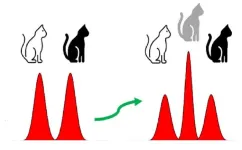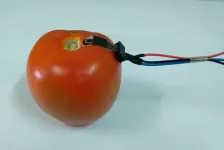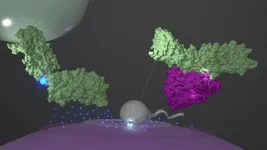(Press-News.org) A new vaccine shows encouraging early results as a potential off-the-shelf treatment for certain patients with pancreatic or colorectal cancer, according to a study co-led by researchers at Memorial Sloan Kettering Cancer Center (MSK). The vaccine targets tumors with mutations (or changes) in the KRAS gene, a driving force in many cancers.
This cancer vaccine is different from another type of pancreatic cancer vaccine, which is custom-made for each patient using messenger RNA (mRNA). Both are therapeutic vaccines given after surgery to prevent or delay the cancer from coming back in high-risk patients.
“Having a vaccine that’s ‘off-the-shelf’ would make it easier, faster, and less expensive to treat a larger number of patients,” says medical oncologist and pancreatic cancer specialist Eileen O’Reilly, MD, who helped lead the trial and is one of the corresponding authors in the study published in Nature Medicine. “This gives hope for people with pancreatic and colorectal cancer who have been out of effective treatments when their disease returns.”
Dr. O’Reilly is co-corresponding author of the Nature Medicine study, along with Shubham Pant, MD, of MD Anderson Cancer Center, and Christopher M. Haqq, MD, PhD, of Elicio Therapeutics.
Clinical Trial Results for Pancreatic and Colorectal Cancer KRAS Vaccine
The phase 1 trial involved 25 patients whose pancreatic or colorectal cancer had certain KRAS mutations and were at high risk of the cancer returning after surgery. The results demonstrated this vaccine is safe and appears to stimulate the patient’s immune system to create cancer-fighting cells:
84% of patients had the desired immune response, meaning that immune T cells targeting KRAS-mutated cancer cells were activated and grew in number.
Also in 84% of patients, a marker for lingering cancer cells — the amount of tumor DNA circulating in the blood — was reduced. In 24% of patients, the tumor DNA was completely absent.
Perhaps most significant, patients who had a higher T cell response also experienced a longer time without the disease returning, known as relapse-free survival.
“In patients whose immune system appeared to respond to the vaccine, the recurrence of cancer was delayed compared with patients who did not respond to the vaccine,” Dr. O’Reilly says. “That’s the type of early clinical effect we can build on.”
Back to top
How Off-the-Shelf Vaccines Targeting KRAS Mutations Differ From Personalized mRNA Vaccines
A different approach to activating immune cells has been led by surgical oncologist Vinod Balachandran, MD. He is investigating whether a personalized mRNA vaccine using proteins from a patient’s pancreatic tumors will alert their immune system that the cancer cells are foreign. In this way, the mRNA vaccine trains the body to protect itself against cancer cells. This vaccine is now being tested in a phase 2 research study at MSK and other institutions.
Personalized vaccines — while promising — also have challenges. They take time to make and are costly. By contrast, an off-the-shelf vaccine manufactured in batches could be given to patients with minimal delay and would be cheaper to produce.
“These findings are exciting because they show we may have more than one way to activate immune cells to target pancreatic cancer,” Dr. O’Reilly says.
END
Vaccine targeting KRAS in pancreatic and colorectal cancer shows promise
2024-02-02
ELSE PRESS RELEASES FROM THIS DATE:
A physical qubit with built-in error correction
2024-02-02
There has been significant progress in the field of quantum computing. Big global players, such as Google and IBM, are already offering cloud-based quantum computing services. However, quantum computers cannot yet help with problems that occur when standard computers reach the limits of their capacities because the availability of qubits or quantum bits, i.e., the basic units of quantum information, is still insufficient. One of the reasons for this is that bare qubits are not of immediate use for running a quantum algorithm. While the binary bits of customary computers store information in the form of fixed values of either 0 or 1, qubits can represent 0 and ...
Biodegradable sensor monitors levels of pesticides via direct contact with surface of fruit and vegetables
2024-02-02
Researchers at the University of São Paulo (USP) and the Federal University of Viçosa (UFV) in Brazil have developed a sustainable sensor that can be placed directly on the surface of a vegetable or fruit to detect the presence of pesticides. Known for this reason as “plant-wearable”, it is made of cellulose acetate, a material derived from wood pulp.
The device has the potential to help assure food safety in a world that increasingly suffers from a shortage of food and the environmental and health problems caused ...
Paper: Multistate foodborne illness outbreaks impact restaurant stock price, public perception
2024-02-02
CHAMPAIGN, Ill. — As demand for food from restaurants soars in the U.S., so does the importance in understanding the impacts of foodborne illness outbreaks. A new paper co-written by a University of Illinois Urbana-Champaign expert in food marketing and food policy finds that outbreaks spanning multiple states bring swift financial losses, increased media attention and a public-relations hit that makes smaller outbreaks more financially damaging.
In the U.S., more than 60% of foodborne illness outbreaks occur at restaurants, and the vast majority of those outbreaks are confined ...
Identifying genomics markers to predict radiation sensitivity
2024-02-02
As the effectiveness of radiotherapy varies greatly between tumours, finding gene signatures to predict the radiation response could better guide the clinicians to personalize treatment plans. Professor Venkata Manem, affiliated with the Faculty of Medicine at Université Laval and the Centre de recherche CHU de Québec - Université Laval, has made a promising step to advance pre-clinical research in the field of precision radiation oncology.
Currently, doctors use a “one-size-fits-all” paradigm for radiotherapy, with a given dose and frequency ...
Turban style and thickness affects head injury risk in Sikh cyclists
2024-02-02
Sudden impacts or jolts to the head can cause skull fractures and traumatic brain injuries (TBIs). TBIs can cause bleeding, unconsciousness, and potential changes to the brain leading to memory loss, mood and personality changes and lack of concentration - sometimes many years after the initial injury.
However, very little research has been done to ascertain the extent and mechanism by which turbans might mitigate impacts to the head during cycling incidents.
Now, researchers from Imperial and the Sikh Scientists Network have studied the performance of turban styles ...
Scientists successfully simulate protein complex that initiates fertilization
2024-02-02
Who hasn't seen it before: the view through the microscope in which a sperm penetrates an egg cell and fertilises it. This fundamental step in procreation happens dynamically and seemingly without problems. However, if you zoom in on the processes that take place during fertilisation at a molecular level, it becomes highly complex and it is thus not surprising that 15 percent of couples worldwide struggle to conceive. No microscope, however modern, can illuminate the countless interactions between the proteins involved. Therefore, the exact trigger for the fertilisation process and the molecular events that transpire just before the fusion of the sperm and egg have ...
Immune cells lose ‘killer instinct’ in cancerous tumors – but functionality can be re-awakened
2024-02-02
Some immune cells in our bodies see their ‘killer instinct’ restricted after entering solid tumours, according to new research.
In a new paper published in Nature Communications, a team led by researchers from the University of Birmingham and the University of Cambridge found how immune cells called natural killer cells (NK cells) rapidly lose their functionality when entering and residing in tumours.
Using tumour cells grown from mice models, the team established that NK cells adopt a dormant state when entering solid tumours through the loss of production of key effector mechanisms used to promote immune ...
Did climate change trigger pandemics in antiquity?
2024-02-02
For their study in Science Advances, the researchers reconstructed temperatures and precipitation for the period from 200 BC to 600 AD, with a resolution of three years. This means that two data points cover a period of three years – an extremely high resolution for paleoclimate researchers. The period extends from the so-called Roman Climatic Optimum to the Late Antique Little Ice Age. This period also includes three major pandemics known from historians’ records: the Antonine Plague (around 165 to 180 AD), the Cyprian Plague (around 251 to 266) and the Justinian ...
Outstanding success in the Excellence Strategy: TU Dresden enters the next round with three new Clusters of Excellence initiatives
2024-02-02
As a result, TUD ranks second overall in the number of calls for proposals in the current competition nationwide. This is according to today’s joint announcement (February 2, 2024) by the German Research Foundation (DFG) and the German Science and Humanities Council (WR). An international panel of experts appointed by the DFG and the WR through the Joint Science Conference (GWK) has assessed a total of 143 draft proposals over the last few days and selected 41 as valuable funding opportunities.
In addition, TUD's three existing Clusters of Excellence have expressed their intent to the DFG that they wish to continue their outstanding research work. TUD, therefore, ...
HMSOM researchers: Data shows clinical trials becoming more inclusive
2024-02-02
Clinical trials and medical research have been historically lacking in diversity among all groups.
But recent trends have been turning the tide at least a little bit toward equity and inclusivity, according to a new meta-analysis published by a team of investigators from the Hackensack Meridian School of Medicine (HMSOM) and the Hackensack Meridian Health Research Institute (HMHRI).
The meta-analysis of clinical trials which included New Jersey patients from 2017 to 2022 show a snapshot of more diverse representation - and better reporting of race and ethnicity factors, according to the new paper in the Elsevier ...






